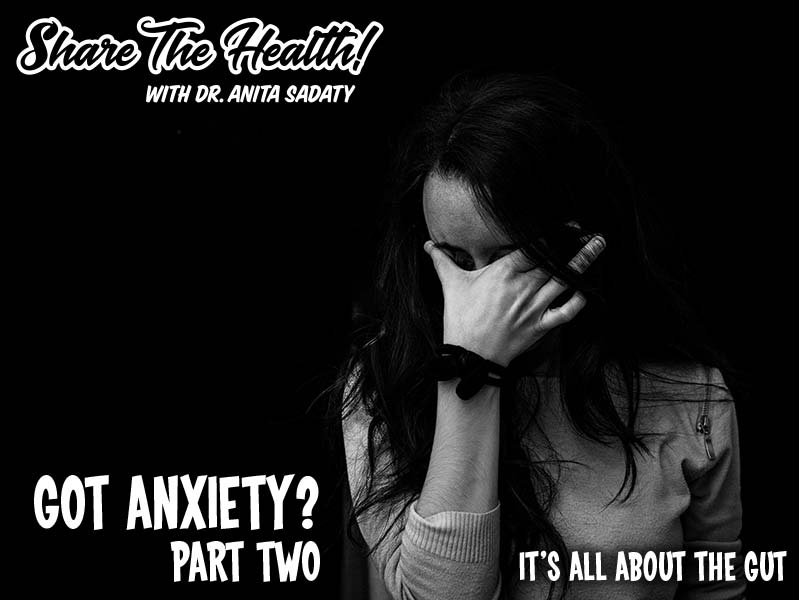
Got Anxiety? Part Two
It’s All About the Gut
I’m sure you have heard people talk about “having butterflies in their stomach” or a “pit in their stomach” when referring to having nerves or anxiety. The unplanned bout of diarrhea when stressed or anxious or the heartburn symptoms that show up when deadlines approach. I will go out on a limb and say that most of my readers have heard me yammer on about the “Gut-Brain Axis.” No, this isn’t scientific code for saying that your head is up your backside. Though that would be kind of funny. What it does mean is that there is a clear connection between the health of your gut and the health of your brain.
Being in a calm, controlled, balanced state of mind means that your parasympathetic, rest and digest nervous system is working. This allows for digestion, normal bowel movements, excellent absorption of nutrients and an overall well functioning intestinal tract. Stress, anxiety, and general feelings of overwhelm will trigger your sympathetic, fight or flight nervous system to be on constantly. The gut basically shuts down and stops working properly. A chronic state of fight or flight will even change the bacterial balance in your gut within as little as 24 hours. Changing your diet for 3 days will do the same. Stick that in your pipe and smoke it! (Ok, boomer). For the record, I am NOT a boomer. I just look like one.
How does gut health impact brain health?
There are many reasons why imbalances in the gut affect brain behavior.
- Lower Serotonin levels: Abnormal gut bacteria can interfere with normal neurotransmitter production. Neurotransmitters are chemicals that carry out brain function and activity. Remember that 90% of serotonin, the feel good brain chemical, is made in your gut.
- Reduced nutrient levels: Inflammation in the gut may block the absorption of nutrients that influence mood. Recall that a lot of vitamins, minerals and amino acids are required to make a healthy balance of brain chemicals like serotonin and dopamine.
- Overgrowth of pathogens: When you don’t have a robust army of “good guys” or beneficial bacteria to act as crowd control in your gut, unsavory organisms can start to crash the party. Parasites, yeast, viruses, Cosmo Kramer or George Costanza. These dangerous critters can start to flourish. Nothing good comes of that. Ask Jerry.
- Food Sensitivities: Eating foods that create allergic reaction or inflammation can result in intestinal wall injury. This so-called “leaky gut” can lead to immune system overactivation which means the brain gets inflamed and reactive.
- Gut infections: If you develop infections in the gut, certain toxins can be released that create inflammatory cytokines (signaling molecules that recruit your immune cells to seek out and destroy harmful invaders). These cytokines communicate danger to the brain, producing symptoms of depression and anxiety for example.

Fixing your Gut: The 4 R’s approach
Fixing gut imbalances and causes for gut irritation will have dramatic effects on your level of anxiety and depression. Studies show that there is a high correlation between people who suffer from IBS (Irritable Bowel Syndrome) and who have either depression and anxiety. Although it is interesting that anti-depressants and anti-anxiety medications can improve IBS symptoms, I feel that this alone is not ideal treatment. It doesn’t really look into the underlying causes of either disorder and may not give you long lasting benefit.
The 4 R approach is a nifty little way to summarize the four main areas of gut health that need to be addressed.
ONE: REMOVE
The first step is to remove inflammatory triggers and pathogens.
Things that can trigger inflammation include:
- Stress (by the way, don’t just “skim” over this one, this is massive in terms of impacting gut and brain)
- Chronic alcohol use (daily or weekly can be enough to do damage)
- Food additives and pesticides in food and water
- Caffeine (even 1 cup of coffee in the morning …..)
- Drugs both over the counter and prescription (especially antibiotics, NSAIDS, aspirin, pain relievers, birth control pills, antacids, acid blockers, and you get the picture)
- Foods that you may be sensitive to (best determined by trying out an elimination diet)
- Gluten and Dairy (no post would be complete without me taking away your two reasons for living)
- Sugar and processed carbohydrates that can feed unsavory bacteria. They LOVE SUGAR. In fact carb and sugar cravings are often the result of yeast or bacterial overgrowth sending signals to your brain to eat more crap!
- Removing pathogens may require antibiotic, antifungal or antimicrobial herbal strategies depending on what is identified in testing. We also sometimes just dive into a 6 week gut repair program without testing to reset and rebalance gut bacteria. Find out more about our 6 week Repair and Clear program.
TWO: REPLACE
The second step is to replace what’s missing to improve digestion and proper absorption. Start with replacing inflammatory foods with nutrient dense, gut healing foods.
Anti-inflammatory foods include:
- high fiber fruits, nuts and vegetables
- omega 3 fatty acids found in wild-caught fish
- extra-virgin olive oil
- Anti-inflammatory spices like turmeric and rosemary
A full on elimination diet is THE BEST way to determine what is harming your gut and your brain health. Believe it or not, EIGHT foods account for about 90 percent of all food-allergy reactions: milk, eggs, peanuts, nuts, wheat/gluten, soy, fish and shellfish.
There are many ways to do an Elimination diet, but frankly, if you are going to start cutting out foods, why not just do it all at once? What if the FOUR you choose to cut out are not the ones? Or they are not the ONLY ones you react to? What if the FIVE aren’t? You get the picture. Common allergens include:
- Dairy
- Gluten
- Soy
- Refined/added sugar
- Peanuts and Nuts
- Corn
- Alcohol
- Eggs
- Usually all packaged, processed or fast foods
- Certain nightshades (eggplant, tomatoes, potatoes, and peppers)
Most elimination diets last for 3–6 weeks. The thought is that antibodies (the proteins your immune system makes when it reacts negatively to foods) take around three weeks to diminish. Three weeks is usually the minimum amount of time needed to start to notice improvements in symptoms.
You may also need to replace digestive supports that may be depleted. Symptoms of bloating, heartburn, reflux, constipation, diarrhea, gassiness or the obvious seeing food pieces in your poops (ewww) are possible signs of deficiencies in digestive supports.
- Hydrochloric acid (your stomach acid) may be depleted. Ironically, this can be why some people have heartburn and reflux. Because they are not adequately breaking down their food. This leads to gas in the small intestine that then backs up into the stomach, which then pushes stomach contents up into the esophagus. Attractive no?
- Digestive enzymes can help breakdown fats, proteins and carbohydrates. Enzymes can sometimes be depleted as a result of prolonged inflammation. I like this digestive enzyme from Pure Encapsulations to be used right before starting to eat your meal.
- Bile acids help digest fat, scrub the gut wall and can act to reduce harmful gut bacteria. This is a great option for bile acid support support, also best taken before meals.

THREE: RE-INOCULATE
The third step is to reinoculate the gut with beneficial bacteria. Reinoculate is a fancy term for put good bacteria back into your gut or build them back up.
- Probiotics can restore the beneficial Bifidobacterium and Lactobacillus bacteria species. They don’t necessarily take up residence when passing through, but they do encourage the growth of beneficial species by what they do in their travels along your gut. They can improve your gut health by releasing anti-inflammatory substances, supporting immune function and healing the gut lining. Orthobiotic and Megasporebiotic are two of my favorite brands.
- Prebiotics are healthy foods that feed the good bacteria. This step is often overlooked and can at times be even more important than just using probiotics. I like using mega-prebiotic or indigo greens for a quick powder on the go.
FOUR: REPAIR
The final step is to repair the intestinal lining with specific nutrients and herbs. These can include different healing substances like: Aloe vera, mastic gum, Deglycyrrhizinated licorice (DGL), L-glutamine, Marshmallow root (Althaea officinalis), Omega-3 fatty acids, Polyphenols, which are compounds found in plants (e.g., quercetin, and curcumin), Vitamins A and D and zinc to name a few. I often like to use combination products that contain all of these essential parts like Glutashield, Repairvite or GI Revive.
There you have it. See what restoring gut health can do for you and your anxiety this season.
Please Share the Health if you liked what you read!!!
For more information about my wellness programs and my practice, check out my website drsadaty.com. Hey Look! You are already here…
Ready for the legal disclaimer? Information offered here is for educational purposes only and does not constitute medical advice. As with any health recommendations, please contact your doctor to be sure any changes you wish to consider are safe for you!
Trackbacks/Pingbacks